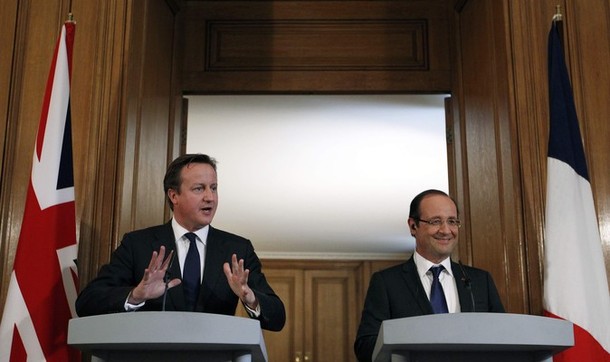
From Julian Lindley-French, the New Atlanticist: The Franco-British strategic defense relationship matters. First, it is a key European-European state relationship beyond EU competence. Second, it is perhaps the only European relationship willing to think big about military matters in a very big military world. Founded on two landmark defense agreements the relationship has long been a strategic cornerstone. The 1998 St Malo Declaration seemed for a time to have resolved tension between NATO and the EU’s defense ambitions and paved the way for the now moribund Common Security and Defence Policy.
On 2 November, 2010 the Franco-British Defence and Security Treaty was signed and heralded a new dawn in the two countries’ strategic defense relationship. The treaty called for “mutual interdependence” and the sharing and pooling of defense materials and equipment, the building of joint facilities and “mutual access” to each other’s defense industries. In addition there were agreements over nuclear stockpile stewardship, a new framework agreement for exchanges on operational matters and a proposal for a Combined Joint Expeditionary Force. At the time there was also agreement that Britain and France should work together on the next generation of aircraft carriers. However, the British decision to revert to the use solely of carrier-based short and vertical take-off aircraft effectively scrapped that line of co-operation.
Two other developments have undermined the relationship. First, the Eurozone crisis has pitched Anglo-French relations into uncharted waters inevitably affecting the strategic defense relationship. France is not only at the heart of the crisis whilst Britain is fast becoming a full-paying third-class member of the EU, Paris has always seen such agreements as a step on the road to a full-blown European defense construct to which Britain is implacably opposed. Economic union will in time make that more likely not less. Second, the 2010 treaty came at a time when Cameron was still early in his premiership and was hoping to ‘rebalance’ Britain’s relationship between Europe and the US. However, such a rebalancing pre-supposed a Britain that would not be forced to choose between its economic relationship with Europe and its strategic defense relationship with the US. The January 2012 shift in US defense posture towards East Asia will indeed over time force Britain to choose. And, given the Great European Defence Depression the British are rightly going with the Americans, even though that will have its own problems.
Given those pressures it will be a miracle if the Franco-British strategic relationship survives…but survive it must for the good of all.
Julian Lindley-French is Eisenhower Professor of Defence Strategy at the Netherlands Defence Academy, Fellow of Respublica in London, Associate Fellow of the Austrian Institute for European and Security Studies and a member of the Strategic Advisory Group of the Atlantic Council. He is also a member of the Academic Advisory Board of the NATO Defence College in Rome. This essay first appeared on his personal blog, Lindley-French’s Blog Blast. (photo: Getty)
Image: cameron%20and%20hollande.jpg
